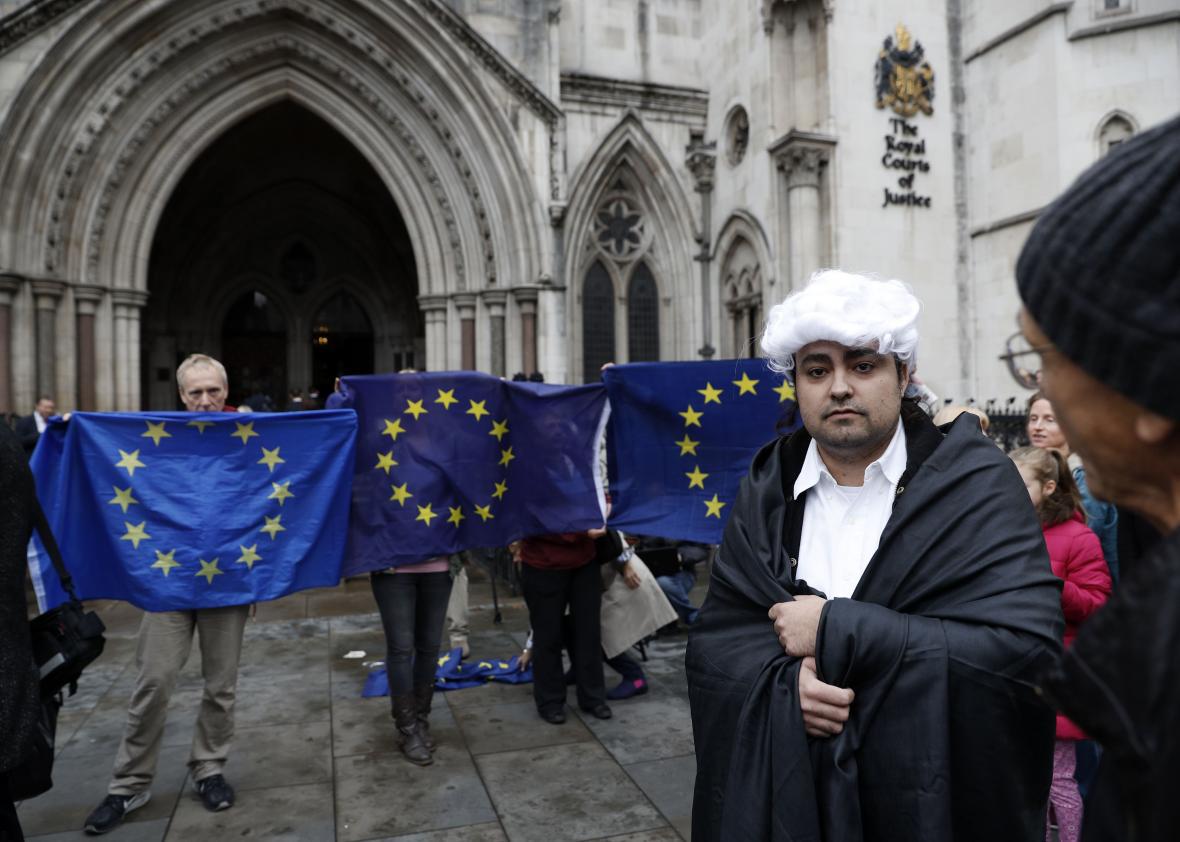Britain’s withdrawal from the European Union, which already seemed to be proceeding according to the rules of Calvinball, got even more convoluted Thursday after the country’s High Court ruled that Prime Minister Theresa May’s government can’t trigger Article 50, the mechanism that will start EU withdrawal negotiations, without an act of Parliament. This doesn’t mean Brexit isn’t going to happen—odds are it still will. But it throws the government’s plans into disarray and will embolden Brexit’s opponents. The pound, which has been down since the Brexit drama began, rose against the dollar when the news broke.
The court was ruling on challenges brought by Gina Miller, an investment manager and philanthropist, and Deir Dos Santos, a hairdresser, whose suits argued that Parliament alone has the power to trigger Article 50 of the Lisbon Treaty. The treaty states that a member country may leave the EU “in accordance with its own constitutional requirements”—which leaves an awful lot open to interpretation. The government had argued that Article 50 falls under its “royal prerogative,” roughly the equivalent of U.S. executive powers except much more vaguely defined, but the three judges examining the case weren’t buying it, specifying that their ruling was a “pure question of law” and that they weren’t taking any stance on Brexit itself.
So what happens now? First, the government will appeal to the Supreme Court, which will likely examine the case in December. If they lose the appeal, it’s not clear exactly how parliament needs to be consulted. If it can be a simple yes-no vote, than May might still be able to trigger Article 50 by the end of March as she planned. If there needs to be new legislation, that could take a while.
So how would a vote in Parliament go? A narrow majority of MPs supported staying in the EU, but would probably be reluctant to go against the will of their voters. UKIP leader Nigel Farage, a leading campaigner for Brexit and Donald Trump supporter, called the ruling a “betrayal.” Jeremy Corbyn, leader of the opposition Labour Party, said Thursday that while Labour respects the vote of the British public, the government should have to bring its negotiating terms to parliament. Liberal Democrat leader Tim Farron said that while the British public voted to leave, they should have the “chance to say no to an irresponsible hard Brexit that risks our economy and our jobs.”
A drawn-out parliamentary process could get ugly, given that Brexiteers have promised voters something that’s essentially impossible—that the country can maintain access to the common market while regaining full control over immigration and eliminating EU regulations. There’s also now discussion of just calling early elections to sort out what it is voters actually want.
While those of us who think British voters made the wrong decision last summer might be encouraged by Thursday’s decision, if parliament did actually use this pretext to reverse Brexit, it would only exacerbate the EU’s biggest fundamental problem going forward: that for an alliance dedicated to promoting democratic values, it’s startlingly undemocratic. Virtually every time the EU project, writ large, is put to a vote in national referenda, whether it was successive drafts of the EU constitution or the common currency, it has lost. But political leaders keep finding ways to ignore the voters. Supporters of the EU failed to make their case to British voters last summer, and if they ultimately find a way to wriggle out of Brexit, it’s only going to further undermine the legitimacy of the institution they’re trying to preserve.
